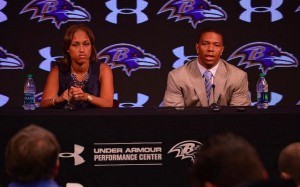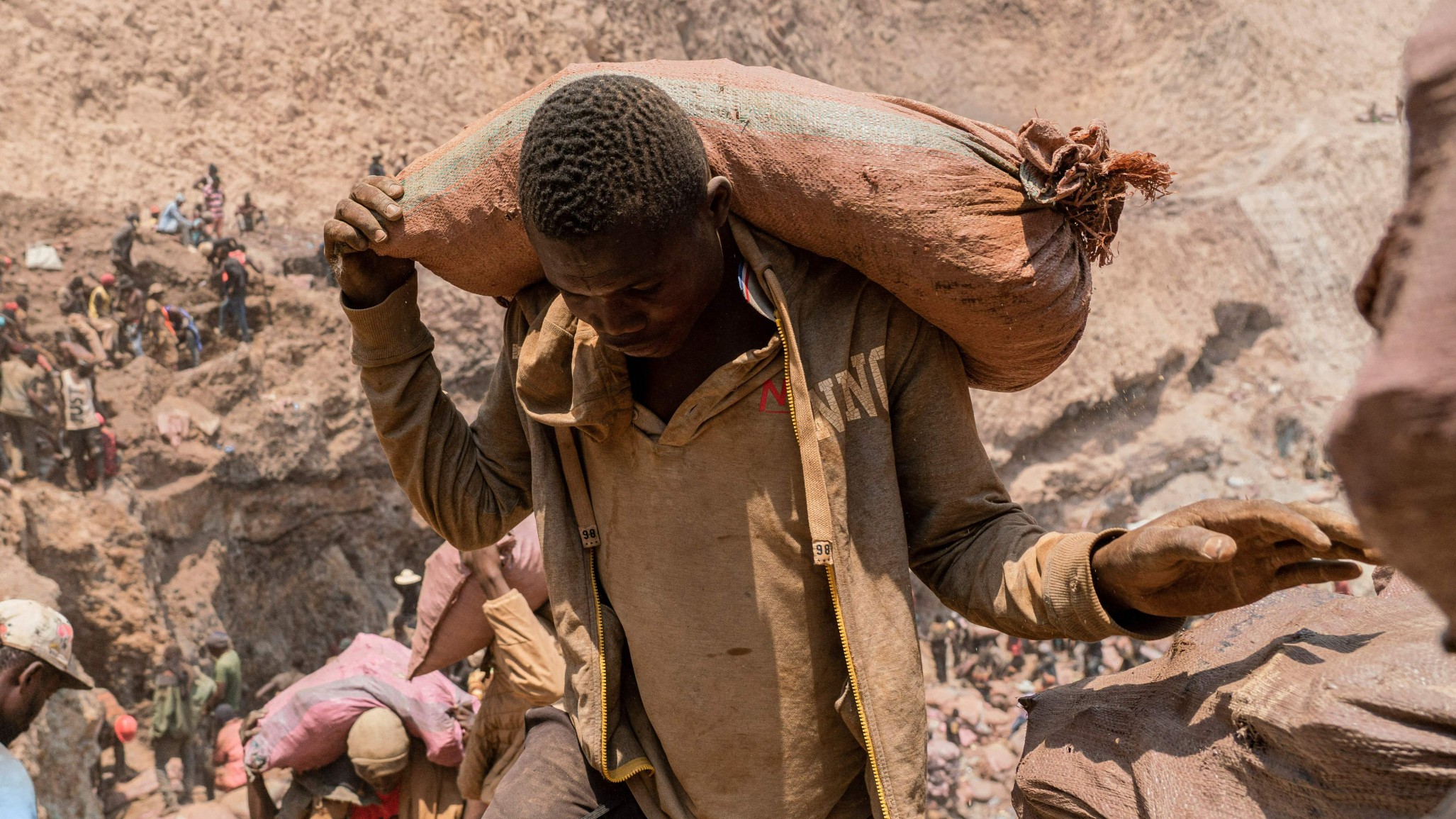
American football player Ray Rice gives a press conference after a video of him knocking his then-fiance (now wife) unconscious is leaked to the public. During the press conference, Rice famously apologized to everyone (fans, his team, etc) except the woman sitting beside him whom he had beaten.
Ever since video footage of American football player Ray Rice brutally assaulting his fiancé in an elevator was leaked, America has been involved in an intense national conversation about domestic violence, how our culture responds to it and, in particular, how the National Football League (NFL) and sports media have handled the incident and other such gender-based crimes committed by players.
But where exactly does the problem lie? Is the Ray Rice incident and its aftermath an example of a problem in American society as expressed by professional football? Or does the problem lie within the American sports complex itself?
I think both. In the case of the first view, in which football is simply the messenger by which the conversation is started, there is a problematic tendency to view women who are victims of domestic violence as (a) stupid for not walking away from their partners sooner and/or (b) partially at fault for the violence inflicted upon them. But in American sports culture and our network of collegiate and professional sports franchises, victims of domestic violence and other gender-based crimes like sexual assault are treated additionally as (c) distractions. They are told – sometimes explicitly, but much more often, through our subtle silence – that they should just grin and bear it so we can move on to watch the big game without any sense of guilt and so they won’t “ruin” the supposedly promising future of a beloved athlete. We’ve seen this time and again when a young woman has tried to come forward to report a sexual assault at the hands of a talented college athlete; and in the case of Janay Rice, we saw the NFL try and contain the incident by having her “talk it out” with her husband and a room full of team executives, resulting in a paltry two-game suspension for Rice – until the video of the full incident was released and the NFL received a public flogging.
And that is the problem with the American sports complex – not that collegiate and professional athletes necessarily commit gender-based crimes at a higher rate than the rest of society, but that, when they do, they are often given a free pass and continue to be publicly celebrated. And it’s not just the team for which they play that sweeps things under the rug so as not to disrupt their profits or have to deal with bad press. Nor is it just the advertisers, many of whom may offer some paltry press releases condemning an act of violence while largely continuing to do business with the NFL (kudos to those advertisers who are the exception in this regard).
The rug-sweeping is also done by the fans. The most obvious examples are those unfortunate souls that will still defend Rice, even to the point of pointedly wearing his jersey after the full story about his crime had surfaced. These, however, are in the minority. What is perhaps more troubling is the stadium of people who gave Rice a standing ovation to welcome him back to the field after his initial two-game suspension. Sure, some of them will say that, at the time, they hadn’t seen the video of Rice knocking out his fiancé, so how could they have known better? But the after-effect video, the one showing Rice nonchalantly dragging his unconscious fiancé out of the elevator like a bag of trash, had already been released. Only willful ignorance could allow someone see that video and conclude that somehow Ray Rice was the one who had been wronged and deserved a hero’s welcome upon return. And only sickeningly twisted logic and a severely misplaced priority on the “redemption” of our beloved player and the return of our normally scheduled football game could somehow turn the story of a man dragging his unconscious partner out of an elevator into the story of a man overcoming “adversity.”
Aside from these two types of fans, though, there is third type that also allows this system to perpetuate. This is the fan who decides to do nothing, who expresses no outrage to team management, who don’t hold the teams accountable for their handling of such incidents even though they are typically so quick to call for, say, a team owner’s resignation over a subpar season, or a referee’s firing after making a series of questionable calls during a game. This is not to say that such fans are necessarily cold-hearted – they most likely will decline to get involved because they simply want to focus on the game that they love, and do not want to focus on the ugliness of an incident that they see as a private matter that could have happened in any American marriage, not just that of someone who happens to be a famous athlete. And these fans may calculate that, of course, their decision to either watch the game or boycott it does not significantly alter profits for the NFL one way or the other. So no, these kinds of fans are not callous people. However, at the end of the day, the end result of such apathy is the same – it’s not those still vocally defending Rice that allow the NFL to get away with mishandling these crimes (the NFL will obviously distance itself from any blatant defense of Rice at this point), but rather the millions of us who remain essentially apathetic and don’t call for changes, who will allow business to continue as usual.
In many ways, this conversation is something that has been ripe for the picking for a while. Football in America is not just a game, but rather a cultural institution and corporate entity that both feeds off of and helps to create our national conversation surrounding gender issues. It is a game played entirely by men, with coaching staff and franchise owners that are almost exclusively men, reported on by a majority-male sports media, cheered on by female cheerleaders meant to be aesthetically pleasing to a male audience, paid for by commercials advertising male-oriented products (trucks, shaving cream, beer), often through the use of a lot of images of hot babes. It is, in that way, a celebration of manhood as it has been constructed in our culture – not, I would emphasize, manhood as it inherently is or has to be. It is this blind celebration of machismo, all wrapped up in a sort of Old Boys Club business model, that limits the definition of ‘manhood’ to stereotypes of chest-thumping and woman-ogling and that denigrates women in large part to the status of sex symbol used to sell products or remain, literally, on the sidelines. American football as it currently exists is part and parcel of our blindness to gender-based inequality, which of course impacts how we discuss gender-based violence when it occurs in this context. And, it should be emphasized, the NFL as a business entity has a terrible track record of handling domestic violence way beyond the specifics of the Ray Rice case.
There are, I think, some kernels of hope for change within football itself. High school and college teams present a unique opportunity for coaches to reach an audience of young men and teach them values that they might not learn elsewhere. It can be a place for a discussion about gender, respect for others, and conducting oneself with integrity on and off the field. Many players have spoken before about how football “saved” them by giving them some much-needed structure, discipline, and mental focus that positively influenced the direction of their lives. But we need these conversations to go further. We need these teams, at all levels, to start seriously discussing gender, manhood and respect for women – and not just respect for one’s mother, which is pretty much always a given, but, explicitly, respect for all of the women that one encounters romantically and/or sexually.
Equally encouraging for the future is the number of women who are joining the ranks of sports journalism – some of whom have recently spoken out in bold terms on the issues of sexism within the world of professional sports. They, however, cannot and should not have to shoulder the burden of change alone. There is a lot of change that is needed at all levels of sports journalism – yes, especially among the men – so that these conversations around gender can create a positive shift. The depressing string of idiotic commentary from various sports teams and commentators following the break of story is enough evidence of the need for change.
But for those of us on the sidelines, who are neither players nor reporters, we are also not off the hook. Fans need to speak up and demand that teams and their advertisers take these off-field issues seriously – otherwise, how can we honestly cheer on these players each Sunday, knowing that our cheers are drowning out any sense of accountability for their actions?



